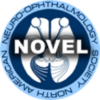Check out this YouTube channel by Dr Lee, chair at Houston Methodist and past president of NANOS, the neuro-op society. It’s a great resource for all neurology residents for short videos teaching important concepts!
I like neuro-op because it’s outpatient and has a very objective, extremely nuanced examination. The proportion of interesting cases (ie zebras) is higher than other subspecialties and there is so much variability in clinic. That being said, you see disorders from basically every subspecialty within neurology even though it’s subspecialized, which I think is cool. You really get to expand your knowledge base in many respects as opposed to some subspecialties where you perhaps really narrow your focus. OCT provides a quick, non-invasive objective test of optic nerve health (similar to EMG in terms of objectivity in some regards) which is really invaluable—as you will learn in neurology any objective measures are helpful for following patients!
It is primarily in academics but there are private practice set ups in decent metro areas. Neurosurgeons both really like having a neuro-op that they trust and it’s a big deal to have access to one. Referrals otherwise come primarily from optometry, ophthalmology, and neurology, with less from PM&R, NSG, endocrine, rheumatology, various other specialties.
I like that most patients have often seen a couple different physicians for the chief complaint and you sometimes get to help the patient out by ending the diagnostic odyssey and finding out what is going on (sometimes really obscure pathology that was missed, sometimes something obvious that makes you lose confidence in healthcare, or sometimes migraine variant or functional).
Coming from neurology it is not procedure heavy—really just Botox for blepharospasm, hemifacial spasm, or chronic migraine in addition are added procedures but as mentioned some don’t do these. OCT, find us photos, and visual fields are billable procedures but are only interpretative. Some neuro-ophthalmologists combine their specialty with headache or MS or general neuro, but the demand is high enough (about 1 for 2.7mil population) that many just do straight neuro-op.
I enjoy eye movements and nystagmus and realized that in residency even some of the best attendings were mystified by the neuro-op exam which led to some curiosity. This ultimately led to spending time with a neurology-trained doc and the rest is history!
obviously I have a biased point of view haha but it’s always worth checking out, just like every subspecialty of neurology! Edit—I’m a fellow, forgot to say that

